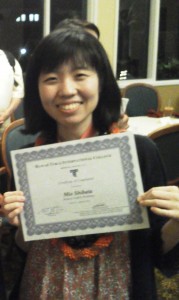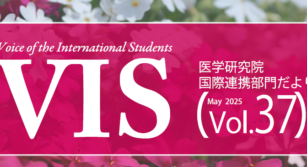Mio Shibata, 5th year medical student, participated in Medical English Workshop at Hawaii Tokai International College in the summer 2014. Mio shares her challenging but valuable experience.
………………………………………………………………………………………………………
Just one email changed my summer vacation unexpectedly. I received it on April 30, and it said JANAMEF -Japan and North America Medical Exchange Foundation- would like to welcome 5 students who were eager to study medical English in Hawaii for a week with a scholarship. JANAMEF is one of the foundations, which support doctors, medical students, nurses and other health professionals for studying or joining seminars abroad. It seemed so interesting but so difficult because only 5 students in Japan would be selected. They needed a motivation letter including what I would do in the future as a doctor. I wrote that medical students should learn how to discuss with doctors in English, I was eager to study abroad someday and this seminar would be the first step for that challenge. I sent the motivation letter and application forms in the middle of June.
On June 27, the acceptance letter arrived! Finding it in the letter box, I felt so happy and decided to absorb information as much as possible. Before the seminar, they asked to mail some documents, health certification and agreement document. Owing to the doctor at the health care center of the university, I had no problem preparing all documents. One of the advice for students who are thinking of joining the seminar abroad, is to take health check-up in the spring otherwise you must hurry just before leaving!
The first day was on August 12 at Hawaii Tokai International College in Honolulu. I got tense before arrival, but all members were kind enough that I felt as if we had been known with each other for a long time. Schedule was full. Classes started at 8:30am and lasted until 9:00pm. Classes in the morning were classroom lecture to learn how to give case presentations, how to communicate with patients and how to confront the ethical problems. At the class of case presentation, we learned how to use a complete format for case presentations. After lunch we visited many places to learn cultures and medical services in the USA. We had a special lecture and workshop of PBL: Problem Based Leaning.
The last class was for medical examination by interview and case presentation. Medical students joined the class as “patients”. They have medical cases and answered our questions. Combining the information from the case, we made case presentations in front of the doctors working in Hawaii. After presentations, doctors advised us. It was my first time to piece together information and make case presentations. I thought that was the most important thing to do, and tried to get any hints to make better presentation through three classes. It seemed like a very short period of time to learn, but was fruitful! Those three intensive classes made my case presentations better and more solid.
On one w eekend, I visited Ronald McDonald House Charities, which provides accommodation for parents whose children are hospitalized. One of their houses is also located in Sapporo. They are originated in the USA and I wanted to see the original one. The officer welcomed me in. There were some volunteers to cook dinners for guests. The charge of the house is free because almost everything is supported by volunteers and companies. How wonderful it is to support sick children and their parents!
eekend, I visited Ronald McDonald House Charities, which provides accommodation for parents whose children are hospitalized. One of their houses is also located in Sapporo. They are originated in the USA and I wanted to see the original one. The officer welcomed me in. There were some volunteers to cook dinners for guests. The charge of the house is free because almost everything is supported by volunteers and companies. How wonderful it is to support sick children and their parents!
My short journey of Medical English didn’t come to an end on the last day in Hawaii. They gave me homework. Most important one is to make the list of differential diagnosis as much as possible from chief complaint. Now I’m seeking the way of finding differential diagnosis from doctors during my bedside training.
Finally, I would like to thank JANAMEF and all who helped me complete this workshop. I hope the students of Hokkaido University will join this workshop in the future!

